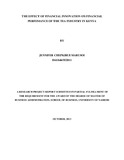| dc.description.abstract | The main objective of this study was to establish the effect Financial Innovation has had in the
Financial Performance in the Tea Industry in Kenya. The financial process innovation introduced
at the end of the year 2009 as an electronic billboard data capture and payment system (ebb) was
meant to create a platform for secure trading for tea trade in Kenya, improve earnings, increase
turnover and reduce trade related costs. Existing studies on financial innovations have focused
more on the financial sector and rarely on the agricultural sector and therefore the study sought
to fill the gap by analyzing the effect financial innovation has had on the financial performance
in tea industry. The study adopted the use of descriptive survey design methodology and used
both primary and secondary data. The population was made up of all the licensed tea
manufacturers / producers (107 factories), tea Buyers / Exporters (65); brokerage firms (10) and
warehouses (16) as at June, 2013. Population refers to players in the tea industry whose
operations are directly affected by the electronic billboard trading system and who are registered
by the Tea Board of Kenya, the Tea Trade regulating government body in Kenya as per Tea Act
Cap 343 of the laws of Kenya. Stratified sampling was used to select the study sample to ensure
that at least an observation is picked from each of the strata. A sample of 30 was selected but 22
responded to a questionnaire giving a response rate of 73.3%. A questionnaire designed on scale
of six was used to collect primary data. Secondary data was collected from firms’ financial
statements for public owned firms which comprised mainly manufacturers / small scale holder
factories and through questionnaire method for privately owned firms. Secondary data collected
included Turnover, Trade Related Costs, and Earnings before Interest and Tax, and Traded
Volumes of Tea. The data period spanned 2008 through to 2011; two years before the
introduction and use of electronic billboard system, the financial innovation process, and two
years after its introduction and use. Primary data was collected and analyzed using descriptive
statistics comprising of the mean and the standard deviation. These were presented in tables as
per each issue addressed in the questionnaire. Secondary data was collected, presented in tables
and analyzed using two regression models to cover the period before and the period after the
introduction of the electronic billboard system at the end of the year 2009. An average for
Turnover, Operating Costs and earnings before interest and tax was calculated based on financial
statements for the period 2008 to 2009 then for 2010 to 2011. Data analysis results at 5%
confidence level showed that before ebb, earnings per unit of sales volumes was not highly
dependent on turnover and trade related costs. The model after the introduction of the ebb gave a
higher level of significance meaning that earnings per unit of sales volumes were highly
influenced by turnover and trade related costs. In conclusion, the study established that the
introduction and use of the financial innovation process in the tea industry has resulted in a
positive effect on financial performance and a better alignment of earnings to turnover and costs.
The study contributes to issues of financial innovation in a non finance sector and also adds to
scant empirical studies on financial innovation in the agricultural sector. On policy matters, Tea
board of Kenya could benefit from the study by looking at how issues of debt, liquidity and
trading platform affect all tea trade stakeholders especially in relation to turnover, earnings
before interest and tax and transfer pricing. Further areas of study would be to go into detail and
establish how the ebb has had an effect on financial performance of each category of players in
the tea industry in Kenya. | en |

